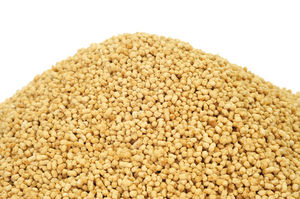Lecithin
| See Also | Food Supplements |
|---|
Lecithin, also known as phosphatidylcholine, is a major component of cell membranes. Biochemically, lecithin and phosphatidylcholine are the same thing. Commercially, the phosphatidylcholine content of lecithin ranges from about 20-90% with most preparations containing 20%. The remaining 80% is a mixture of other lipids. Most lecithin is produced from vegetable sources. Phosphatidylcholine is an important deliverer of choline, a component of the neurotransmitter acetylcholine, the methyl donor betaine, and various other phospholipids. Phosphatidylcholine acts in the hepatic export of VLDL (very low density lipoprotein) and therefore is important for proper fat transport away from the liver. [1]
Sources
- Food sources of lecithin are derived mostly from soybean, sunflower, and rapeseed with soybean being the most commonly used. Eggs also naturally contain about 68-72% phosphatidylcholine while soya contains 20-22%.[1]
- Lecithin is commonly used as a food additive in foods requiring a natural emulsifier or lubricant such as chocolate, margarine, salad dressings, spreads, etc.
- Lecithin is used for applications in human food, animal feed, pharmaceutical, paint, and other industrial applications.
Uses
Lecithin is believed to be beneficial in the treatment of the following conditions:
- High Cholesterol
- Atherosclerosis
- Decreased memory function
- Liver disease
Prescribing Considerations
- The recommended dosages have not yet been established. To determine what your specific requirements are talk to your naturopathic doctor or other trained medical professional.
- Each tablespoon (7.5 grams) of lecithin granules contains about 1700 mg of phosphatidyl choline, 1000 mg of phosphatidyl inositol, and about 2,200 mg of essential fatty acids as linoleic acid. It also contains linolenic acid.
- Lecithin is generally taken orally in the form of granules which are mixed with juice, milk or yogurt. Lecithin granules do not dissolve and have a bit of crunchy taste.
- Note: is you put lecithin granules on hot food they will melt and you will then have liquid lecithin.
Safety
Lecithing is generally regarded as safe.
